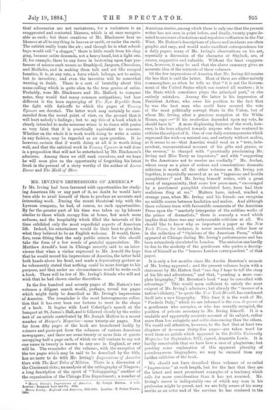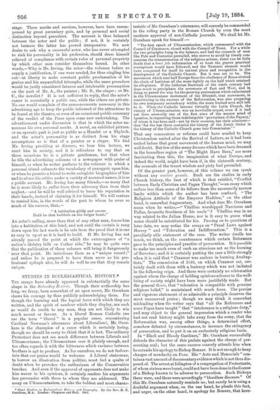MR. IRVING'S IMPRESSIONS OF AMERICA.* IF Mr. Irving had been
favoured with opportunities for study- ing American life or any part of it, no doubt he would have been able to avail himself of them to produce an accurate and interesting work. During the recent theatrical trip with the Lyceum company, he had, of course, no such opportunities. By far the greater part of his time was taken up by labours similar to those which occupy him at home, but much more arduous, and the hospitality which filled the intervals of his time exhibited only the most superficial aspects of American life. Indeed, his entertainers would do their best to give him what they believed to be an English welcome. It would, there- fore, seem fitting that the only public return for this should take the form of a few words of grateful appreciation. Mr. Matthew Arnold's host in Chicago recently said to an inter- viewer that when a visitor expressed to Mr. Arnold the hope that he would record his impressions of America, the latter held both hands above his head, and made a deprecatory gesture as he vehemently stated that nothing could be more foreign to his purpose, and that under no circumstances would he write such a book. There will be few of Mr. lrving's friends who will not wish that he had shown similar discretion.
In the five hundred and seventy pages of Mr. Hatton's two volumes a diligent search would, perhaps, reveal ten pages which might fairly be described as Mr. Irving's impressions of America. The remainder is the most heterogeneous collec- tion that it has ever been our fortune to meet in the shape of a book. It begins with Lord Coleridge's speech at the banquet at St. James's Hall, and is followed closely by the entire text of an article contributed by Mr. Joseph Hatton to a recent number of Harper's Magazine—some twenty-six pages. Not far from fifty pages of the book are transferred bodily by scissors and paste-pot from the columns of various American newspapers ; and there are some twenty or more lists of guests occupying half a page each, of which we will venture to say not one name in twenty is known to any one in England, or ever will be. The remainder of the volumes, with the exception of the ten pages which may be said to be described by the title, has no more to do with Mr. Irving's Impressions of America than with The Lost Tales of Milelus. There is a discussion of the Cincinnati riots ; an analysis of the orthography of Niagara ; a long description of the sport of "Tobogganing," another of the organisation of the Chicago Fire Department ; a number of
• Henry Irving's Impressions of America. By Joseph Batton. 2 vols. London: Sampson Low and Co. 1884. • Henry Irving England and America, 1835-1884. London : T. Fisher Unwin. 1884.
American stories, among which there is only one that the present writer has not seen in print before, and finally, twenty pages de- voted to accounts of notorious and repulsive ruffianism in the Far . Wrest. Mr. Hatton's descriptions of places and incidents are often graphic and racy, and would make excellent correspondence for a daily paper; many of Mr. Irving's observations on his art, especially a discussion of the character of Shylock, are, of course, suggestive and valuable. Without the least exaggera- tion, however, it may be said that the above summary gives an accurate idea of the contents of these volumes.
Of the few impressions of America that Mr. Irving did receive the less that is said the better. Most of them are either naively commonplace, as when he tells us that " it is not the Govern- ment of the United States which can control all matters ; it is the State which sometimes plays the principal part," or else entirely mistaken. Among the latter is his impression of President Arthur, who owes his position to the fact that he was the best man who could have secured the vote of the most politically corrupt State in the Union, but of whom Mr. Irving, after a gracious reception at the White House, says :—" If his re-election depended upon my vote, he should have it." A more displeasing feature of the work, how- ever, is the tone adopted towards anyone who has ventured to criticise the subject of it. One of our daily contemporaries which expressed the wish—a natural one, and entirely without malice, as it seems to us—that America would send us a " true, inde- pendent, unconventional account of his gifts and graces, or the reverse," is charged with " practically proclaiming Mr. Irving and Miss Terry as impostors," and with " suggesting to the Americans not to receive me cordially." Mr. Archer, whose essay as a piece of serious and conscientious dramatic criticism is worth all the other volumes on Mr. Irving put together, is repeatedly sneered at as an " ingenious and hostile pamphleteer ;" and Mr. Irving himself writes, with a great want of magnanimity, that some few press-men, "encouraged by a parchment pamphlet circulated here, have had their malicious fling at me." Matters have, indeed, reached a strange pass, when Mr. Irving and his friends can recognise no middle course between laudation and malice. And although these volumes teem with favourable comments of the American Press upon the " masterly interpreter of the sublime works of the prince of dramatists," there is scarcely a word which implies that there was any unfavourable criticism at all. We should like to know why so important a paper as the New York Times, for instance, is never mentioned, either here or in the collection of " Opinions of the American Press," which appeared at Chicago during Mr. Irving's performances and has been extensively circulated in London. The omission can hardly be due to the modesty of the gentleman who quotes a descrip- tion of himself as the " famous London correspondent " of that paper.
It is only a few months since Mr. Austin Brereton's memoir of Mr. Irving appeared ; and the present volumes begin with a statement by Mr. Hatton that "one day I hope to tell the story of his life and adventures," and that, " pending a more com- plete biography," Mr. Brereton's book " may be consulted with advantage." This would seem sufficient to satisfy the most exigent of Mr. Irving's admirers ; but already the " incense of a nation's idolatry," to quote the Ncw York Herald, has condensed itself into a new biography. This time it is the work of Mr. " Frederic Daly," which we are informed is the nom de guerre of a gentleman who occupies, or who has recently occupied, the position of private secretary to Mr. Irving himself. It is a readable and apparently accurate account of its subject, rather more than less eulogistic and critic-denouncing than the others. We would call attention, however, to the fact that at least two chapters of it—some thirty-five pages—are taken word for word from an article which appeared in the Dublin University Magazine for September, 1877, signed, Augustin Lewis. It is hardly conceivable that we have here a case of plagiarism ; but pending some explanation of this apparent plurality of pseudonymous biographers, we may be excused from any further criticism of the book.
We should not have described these volumes of so-called " Impressions " at such length, but for the fact that they are the latest and most prominent examples of a tendency which calls for more consideration than it has yet received. Mr. Irving's career is indisputably one of which any man in his profession might be proud, and we are fully aware of his many merits as an actor and of the services he has rendered to the
stage. These merits and services, however, have been recom- pensed by great pecuniary gain, and by personal and social . distinction beyond precedent. The account is thus balanced between the actor and the public ; if not, it is certainly not because the latter has proved irresponaive. We now desire to ask why a successful actor, who has never attempted to sink his personality in his profession, should deem himself relieved of compliance with certain rules of personal propriety by which other men consider themselves bound. In other words,—Why is Mr. Irving, the actor—the volumes before us supply a justification, if one were needed, for thus singling him out—at liberty to make constant public proclamation of his genius and his unparalleled triumphs, while the same procedure would be justly considered fatuous and intolerable presumption on the part of Mr. A., the painter ; Mr. B., the singer ; or Mr. C., the novelist P It is not sufficient to reply, that the actor's career is essentially a public one, while the others are private. No one would complain of the announcements necessary in this advertising age to keep the public informed of the attractions to be found at the theatre, or even of an occasional public summary of the verdict of the Press upon some new undertaking. The advertisement under discussion is that in which the actor an- nounces his own personal merits. A novel, an exhibited picture, or an operatic part is just as public as a Hamlet or a Shylock, and the actor's personality is as distinct from his stage assumptions as is that of a painter or a singer. We find Mr. Irving presiding at dinners, we hear him lecture, we meet him in society, and it is ridiculous to say that on these occasions he is a private gentleman, but that when he fills the advertising columns of a newspaper with praise of himself, or when he writes prefaces to the volumes in which a personal friend exhausts the vocabulary of panegyric upon him, or when he permits a friend to write eulogistic biographies of him and to abuse his critics under a variety of assumed names, it is as a public servant. Mr. Irving has many friends,—so many that he is more likely to suffer from their advocacy than from their neglect, —and he will be well advised to leave his reputation in their hands, instead of claiming it for himself. We will venture to remind him, in the words of the poet to whom he owes so much of his success, that,—
" A habitation giddy and unsure
Rath he that buildeth on the vulgar heart."
An actor's calling, more than that of any other man, forces him into a habitation of this kind, and not until the curtain is rung down upon his last words is he safe from the proof that it is one as easy to upset as it is hard to build. If Mr. Irving has not already passed the point at which the extravagance of "a nation's idolatry falls on t'other side," be may be quite sure that the publication of these volumes will bring it dangerously near that point. He introduces them as a "unique record ;" and unless he is prepared to have them serve as his pro- fessional epitaph also, he will do well to see that they remain unique.



































 Previous page
Previous page